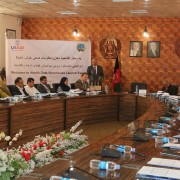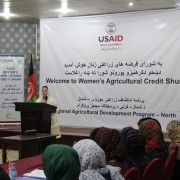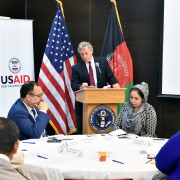The Kabul Urban Water Supply (KUWS) project, implemented by the German Development Bank (KfW) at the request of the Afghan government, is building the water infrastructure to pipe drinking water to 50 percent of Kabul city residents. The current water system, operated by the Afghanistan Urban Water Supply and Sewerage Company, supplies less than 20 percent of the population. The KUWS project is improving the water system, reducing health risks, and improving livelihoods for Kabul residents.

Using support from USAID, Afghanistan’s Ministry of Public Health (MoPH) today launched the country’s Data Warehouse, a web-based system for storing and sharing public sector health data with stakeholders and policy-makers.

When it comes to accessing credit for women farmers and women-owned agriculture-related businesses, challenges have often forced these operations to close because of a lack of understanding how credit works. The United States Agency for International Development (USAID) wants to change that and help these women prosper in their businesses.
The Technical Assistance to the Ministry of Public Works project, a component of the USAID Road Sector Sustainability Program, assisted the Afghan government to sustainably manage the country’s road network using three new institutions – a semi-autonomous Road Authority to manage road maintenance and development, a semi-autonomous Road Fund to provide sustainable financing, and a Transportation Institute to train and to build the capacity of Afghan professionals to plan, analyze, and manage the road sector.









Comment
Make a general inquiry or suggest an improvement.